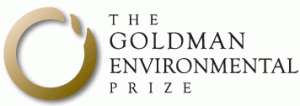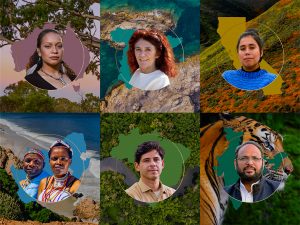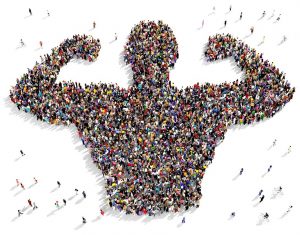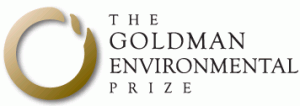 Those of us who have been paying attention and understand the threats and troubles that are coming to almost everyone in the U.S. (and to the health of our air, water, lands, ecosystems, and climate) will be among those who are most ready and equipped from the outset to try to reduce some of the harms. None of us gets to choose the era we live through or to control a whole lot about the world we live in. But we should strive to rise to the challenge of the situation we face, by doing what we can to make our communities, our country, and our world as livable (and worth living in) as we can. We can strive to be among the lights that will guide the way through the darkness.
Those of us who have been paying attention and understand the threats and troubles that are coming to almost everyone in the U.S. (and to the health of our air, water, lands, ecosystems, and climate) will be among those who are most ready and equipped from the outset to try to reduce some of the harms. None of us gets to choose the era we live through or to control a whole lot about the world we live in. But we should strive to rise to the challenge of the situation we face, by doing what we can to make our communities, our country, and our world as livable (and worth living in) as we can. We can strive to be among the lights that will guide the way through the darkness.
I hereby send you my wishes of strength, courage, endurance, solace, serenity, and solidarity. And I offer up some specific ways to cultivate and exercise those skills, presented below in the following sections:
- Self-Care
- Community Care
- City/County Action
- State Action
- Personal Actions
- Organizations and Resources
I will probably update and add more suggestions to this guide over time.
Self-Care
To be able to help others, we first have to take care of ourselves: our physical and mental health and wellbeing. We can only help others well when we are feeling fairly strong and stable ourselves. We can take turns falling apart or breaking down; and we should accept and ask for help or support when we need it. We all have our own ways of coping, self-soothing, and caring for ourselves, but here are some general tips and reminders:
- Get enough sleep, every night that you can. We can’t function properly or stay healthy without deep sleep.
- Eat nutritious foods (and if possible, take a multivitamin or at least Vitamin D/K, especially in the winter).
- Get some exercise almost every day, even if it’s just some stretching or a short walk (or working in a garden).
- Stay connected with good friends. Regularly reach out and make time for friends and supportive family.
- Our brains are not equipped to take in bad news from all over the country and world, all day every day. We cannot process all of that information, and we can’t expect ourselves to carry the weight of the world. Set aside periods of time (at least one day a week, and ideally a portion of every day) when you will not look at media, social media, or emails and expose yourself to the day’s horrors. Try to stay grounded in the Here and Now (“the present”) whenever you can, rather than becoming overwhelmed with the There and Everywhere and Everyone and the Future/Forever. Make time for some humor and comedy, amidst tragedy. Build time into each day when you and your brain can rest and recover. You could try deep/slow breathing exercises that are proven to help us relax (like cyclic sighing and “bee breath“), meditation, or other relaxation or mindfulness techniques. Or listen to music or do something creative. Try to get out into natural settings (e.g., parks, forests, waterbody areas, vista points) and spend time with animals as much as you can. If you still regularly struggle with overwhelm, look for (or establish) a Support Group or find a therapist.
- Remind yourself to notice and seek out and appreciate beautiful things (large and small), funny things, good moments, good news, good people (helpers), glimmers of compassion or beauty or joy, to counter the ugliness. Share some of these good things with other people (through conversations, posts, photos).
- Self-Care Resources: Good Grief Network; various Pema Chodron books (e.g., When Things Fall Apart, etc.); Yoga with Adriene (free videos on YouTube). A few people/pages to follow online for wisdom and inspiration: Cole Arthur Riley, Anne Lamott, Brene Brown, Rebecca Solnit, Ami Dar, Hell and Earth, Humanity & Peace; and Trae Crowder (for humor!).
“I am only one, but I am one. I cannot do everything, but I can do something. And I will not let what I cannot do interfere with what I can do.”
– Edward Everett Hale
“Do not be daunted by the enormity of the world’s grief. Do justly, now. Love mercy, now. Walk humbly, now. You are not obligated to complete the work, but neither are you free to abandon it.”
– The Talmud
We may not be able to stop many or even most of the awful things that are coming (and we certainly can’t do so all by ourselves, as individuals). But together, we can focus on harm reduction strategies. We can try to influence (or delay/stymie) what happens at the national/federal level, but in the near future, more victories and improvements will probably be made at the local/community/city/county and state levels (as well as at the international level, or in other countries), so focus most of your energy on those efforts. Even if we cannot make the world or our immediate future good, we can do our best to make it less bad, and limit unnecessary suffering as much as possible. Small improvements and victories are important. Even if each of us can only help a few beings and make their lives easier—or save even one being (or wild place)—those efforts will be worthwhile.
Working with other people is rarely easy, but it’s necessary and can be rewarding and effective. We’ll have to summon up as much patience and kindness as we can, despite the circumstances, and resist falling into permanent despair or hopelessness/fatalism, or the urge to become cold and unfeeling or to isolate ourselves from others, as that may seem like the easier path. We’ll never agree with or relate to everyone else or their tactics or their way of dealing with things. But we have to continuously try to accept our forgivable differences, to not let our egos get in the way, and to not turn on (or away from) each other. We should strive to be of service, and to give what we can.
“Wealth among traditional people is measured by having enough to give away.”
– Robin Wall Kimmerer, Braiding Sweetgrass
Here are suggestions of some concrete ways to make a difference:
Community Care
- Get to know your neighbors, and check in on them or offer to help out if they need anything (especially any neighbors who are elderly, disabled, alone, or vulnerable). Also periodically reach out to friends, and find out what they might need.
- Find and support local groups that help the most vulnerable (e.g., immigrants/refugees, unhoused people, the disabled or elderly, poor/low-income people, abused or neglected/foster children, domestic violence survivors, trans and gay people, people with severe mental illness, prisoners and detainees, and animals). For example, you could support local shelters, housing groups, food banks/pantries, and Community Action Agencies. Also search for (or start) a local Mutual Aid group or CERT (Community Emergency Response Team) group. Choose at least one local group to get involved with, through volunteering or donations. (Or choose different groups to support each month or year.)
- Support (and use) your library, as well as local arts organizations or venues, and community gardens.
- Volunteer at or support the local, state, and national parks in your region.
- Find (or start) a local climate action group, even if it’s just with a few friends or co-workers. (Look into the Climate Survival tools provided by The Climate Mobilization.)
- Donate needed/requested items to a local group for the unhoused or the poor. Items that are often needed include clothing (e.g., coats, underwear, warm socks, gloves, hats, scarves, snow/rain pants, other layers, shoes/boots); tents, sleeping bags, blankets, and hygiene items. You could also give money, food, and needed items directly to unhoused people.
- Put some food items in a Little Free Library box (if there’s room). Or build a Free Food Pantry box in your front yard, or suggest that local churches or grocery stores do this.
- Patronize/support small, local businesses, worker-owned businesses/cooperatives (coops), local farms/farmers and farmer’s markets.
- Propose that your local Democratic Party office (or a specific candidate’s campaign office) be used regularly as a space for local community organizing and mutual aid initiatives that help meet people’s needs (e.g., food donations and distribution, housing assistance, etc.).
City/County Action
- Tell your city and/or county leaders (mayor, city council, county commissioners and officials) to build more affordable housing for low-income people, as well as tiny home communities or apartments and/or RV parking areas (with support services) for unhoused people, and more shelters (that are also set up to accept people who have pets).
- Tell your city and county that you do not support the mass deportation or detention of immigrants, and you want them to protect immigrants in your community in any ways that they can.
- Ask your city or county to start a UBI (Universal Basic Income) program. These programs have proven very successful.
State Action
- Support groups that focus on state and local races/elections (e.g., DLCC, The States Project, Sister District, Oath, Every State Blue, and your state and local Democratic Party). There are important state/local elections (including “special elections” to fill vacant seats) every year. State Supreme Court races are especially important, but often neglected by funders and voters.
- Tell your state representatives and Governor to immediately develop and pass Healthcare for All /Universal Healthcare legislation for your state, and to develop state-based programs that could help shore up residents’ Social Security (retirement and disability) and Medicaid benefits if federal benefits are cut. Also demand that they pass anti-poverty laws and initiatives, including a much higher minimum (living) wage, paid medical/parental/caregiver leave and paid sick days requirements for everyone employed in your state, stronger affordable housing regulations/enforcement, more housing and support services for the unhoused, and a UBI (Universal Basic Income) program.
- Tell your state representatives to protect and conserve your state-owned public lands, and not to allow them to be used/exploited or leased for resource extraction and profit (logging, mining, rampant grazing, or development). Tell them to designate more land for wilderness/wildlife conservation and state parks.
- Tell your state representatives to pass legislation that will protect doctors, patients, and anyone who assists people in seeking reproductive health care (including communicating about or mailing/using/traveling for medication abrtion or surgical abrtion, miscarriage care, emergency contraception, and contraception) from federal or out-of-state prosecution.
Personal Actions
- Try to set aside more savings for your retirement and emergency/medical expenses, as ACA health insurance, Medicaid, Medicare, and Social Security are likely to be cut or cut back by the new regime (to pay for their tax cuts for the wealthy).
- If you know someone who has student loans they are struggling to pay down/off and you are financially comfortable, you could offer to help them with their payments.
- If you have a bank account with one of the large, national banks (especially Wells Fargo, Citi, Chase, or Bank of America), one of the best things you can do is to move your money to a local credit union (or a green bank, or a customer-recommended community bank that doesn’t gouge its own members). And if you have any stock-based investment accounts (401Ks, mutual funds, etc.), make sure they aren’t funding evil companies and switch them to socially/environmentally responsible investment accounts.
- To stop feeding the beast, opt out of shopping at (i.e., giving your money to) predatory, greedy, exploitative corporations (e.g., Amazon, Walmart, Home Depot, Uline, and most other large, multinational companies) whenever possible. Instead, try to support small, local businesses, and B Corps-certified or benefit corporations or worker-owned businesses that are socially and environmentally responsible and good to their employees.
- Start growing some of your own food, and if you grow more than your family can eat, share the bounty. Also buy food from local (organic) farm stands and farmer’s markets.
- Subscribe to and share information from media outlets that consistently produce solid, independent, fact-based journalism, e.g., ProPublica, Courier Newsroom, States Newsroom, The Guardian, Scientific American, Mongabay, Mother Jones, The Tennessee Holler, Press Forward, local newspapers and public radio stations, NPR, PBS, etc.
- If you are financially secure, consider using some of your money to donate to Land Trusts (local/regional or international) or re-wilding organizations, or purchase a forest or wildland property (or other undeveloped, non-urban land parcel)—to protect it from development, logging, industrial/Big Ag, or other destructive uses, and to conserve (or clean up/remediate and re-wild) the land, or to convert industrial farmland to organic farming. You can work with a regional Land Trust or conservation group to make sure it will be permanently protected beyond your lifetime.
- Support and help fund community solar projects, and tell your state and local representatives and your utilities to build more solar/wind projects and renewable microgrids for energy security. If your utility offers a renewable energy program, sign up for it.
- In addition to local and state and national groups, identify at least one international organization (or an organization based in another country) to donate to. The next section (Organizations and Resources) lists a number of groups to check out. Also consider doing more direct giving to people in need, in person or through sites like GiveDirectly, Kiva, and GoFundMe.
- Implement online/digital privacy and security recommendations, including these and others published by the Electronic Frontier Foundation (EFF) or by WIRED. Use the Signal app for private/secure texting. Also check out services that get your personal information off of data broker websites, and consider getting identity theft insurance and other security/privacy protections from a service such as Aura. There are so many scammers and hackers out there (and surveillance), and our federal government is going to destroy its consumer protection apparatus (e.g. the CFPB), so we have to find other ways to protect ourselves from spying, scams, and hacks.
- If you don’t want to have kids (or don’t want to have more kids), you could get a tubal ligation (or for men, a vasectomy, which is reversible)—or a birth control implant or IUD (which work for many years)—so you won’t be at risk of getting pregnant or at risk of dying due to life-threatening pregnancy complications or a partial miscarriage that might not receive prompt or proper medical treatment due to abrtion bans. You could also donate to clinics that provide vasectomies and tubal ligation and contraceptive implants and IUDs, so they can provide these services to people who cannot afford them. And you could buy contraception (e.g., the over-the-counter O-pill, condoms, or some packages of emergency contraception e.g. Plan B or other brands) for anyone who might need them now or in the future. Some states have signaled that they are likely to try to curtail or ban contraception.
Organizations and Resources
Also see: Non-Profit Organizations to Know (organized by topic)
Other Relevant Posts:
December 10, 2024
 The Goldman Environmental Prize is the world’s largest and most prestigious annual award for grassroots environmentalists. Some people refer to it as the “green Nobel.” Goldman Prize winners are models of courage, and their stories are powerful and truly inspiring. “The Prize recognizes individuals for sustained and significant efforts to protect and enhance the natural environment, often at great personal risk. Each winner receives a financial award. The Goldman Prize views ‘grassroots’ leaders as those involved in local efforts, where positive change is created through community or citizen participation in the issues that affect them. Through recognizing these individual leaders, the Prize seeks to inspire other ordinary people to take extraordinary actions to protect the natural world.” Over the 36 years that the Prize has been awarded, there have been 226 recipients of the prize.
The Goldman Environmental Prize is the world’s largest and most prestigious annual award for grassroots environmentalists. Some people refer to it as the “green Nobel.” Goldman Prize winners are models of courage, and their stories are powerful and truly inspiring. “The Prize recognizes individuals for sustained and significant efforts to protect and enhance the natural environment, often at great personal risk. Each winner receives a financial award. The Goldman Prize views ‘grassroots’ leaders as those involved in local efforts, where positive change is created through community or citizen participation in the issues that affect them. Through recognizing these individual leaders, the Prize seeks to inspire other ordinary people to take extraordinary actions to protect the natural world.” Over the 36 years that the Prize has been awarded, there have been 226 recipients of the prize.





 Those of us who have been paying attention and understand the threats and troubles that are coming to almost everyone in the U.S. (and to the health of our air, water, lands, ecosystems, and climate) will be among those who are most ready and equipped from the outset to try to reduce some of the harms. None of us gets to choose the era we live through or to control a whole lot about the world we live in. But we should strive to rise to the challenge of the situation we face, by doing what we can to make our communities, our country, and our world as livable (and worth living in) as we can. We can strive to be among the lights that will guide the way through the darkness.
Those of us who have been paying attention and understand the threats and troubles that are coming to almost everyone in the U.S. (and to the health of our air, water, lands, ecosystems, and climate) will be among those who are most ready and equipped from the outset to try to reduce some of the harms. None of us gets to choose the era we live through or to control a whole lot about the world we live in. But we should strive to rise to the challenge of the situation we face, by doing what we can to make our communities, our country, and our world as livable (and worth living in) as we can. We can strive to be among the lights that will guide the way through the darkness.









 This is a listing of some legal organizations that I recommend following, learning more about, and potentially supporting. They all use the law to try to serve and support the common good in various ways: to protect humans and human rights, civil rights, and civil liberties; to protect animals and the rights of non-human species; and/or to protect nature, our shared environment, and the livability of our planet.
This is a listing of some legal organizations that I recommend following, learning more about, and potentially supporting. They all use the law to try to serve and support the common good in various ways: to protect humans and human rights, civil rights, and civil liberties; to protect animals and the rights of non-human species; and/or to protect nature, our shared environment, and the livability of our planet.
